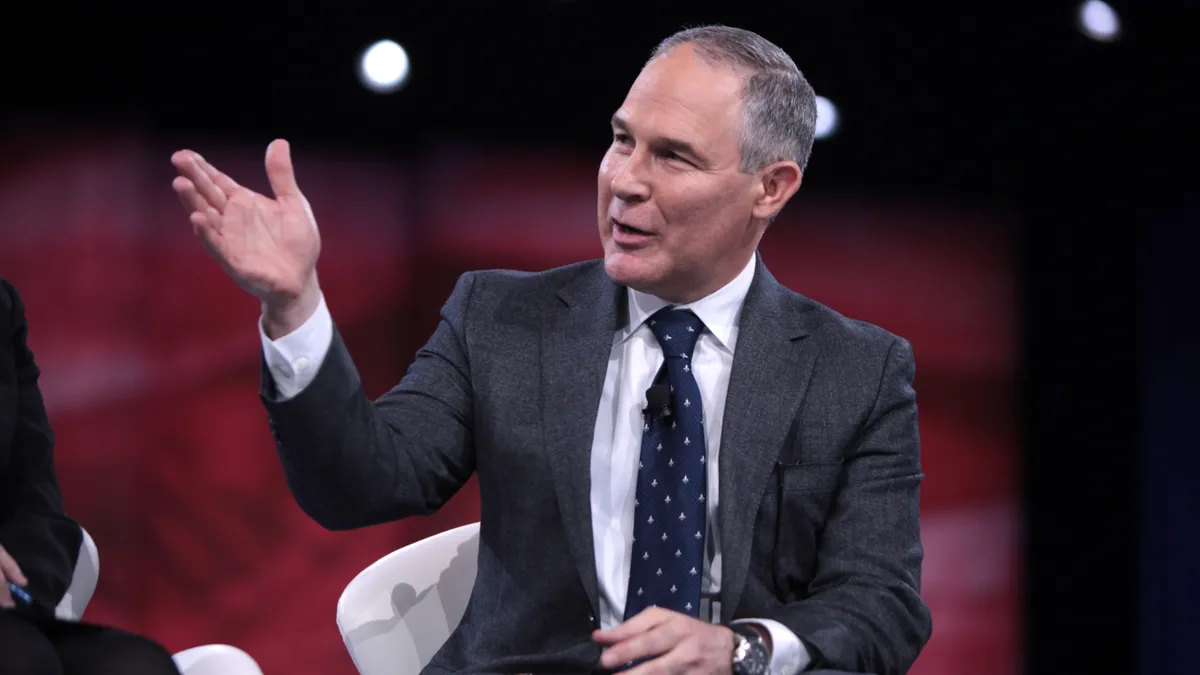Dive Brief:
- The U.S. Senate voted on Thursday to invoke cloture and end debate over President Trump's choice to lead the Environmental Protection Agency, likely setting up a final vote Friday to confirm the controversial nominee.
- The Hill reports senators voted 52-46 to move forward to a final confirmation vote for Oklahoma Attorney General Scott Pruitt (R). Sens. Heidi Heitkamp (D-ND) and Joe Manchin (D-WV) joined Republicans in voting for cloture. Sen. Susan Collins (R-ME) voted for cloture, but has said she will vote against Pruitt's final confirmation.
- Democrats called for a delay in the final vote after an Oklahoma judge ordered the release of more than 3,000 documents requested from Pruitt's office by a liberal group under open records laws. Critics are concerned the communication records will uncover deeper ties between Pruitt and the fossil fuel industry, but Republican leaders are still expected to push for a vote.
Dive Insight:
Scott Pruitt moved a step closer to leading the agency he has often sued, and though the vote will be close, he is expected to be confirmed.
The final vote is slated for Friday, and the Hill reports Pruitt is expected to win the support of 52 senators.
Two Democrats, both from coal-heavy states, voted in favor of cloture and support Pruitt. Susan Collins, a Republican from Maine, has said she will break rank and oppose his nomination. Sen. John McCain (R-AZ) is at a security conference and is not expected to vote.
Collins said this week she has concerns that Pruitt "actively opposed and sued EPA on numerous issues that are of great importance to the state of Maine, including mercury controls for coal-fired power plants and efforts to reduce cross-state air pollution and greenhouse gas emissions."
Collins' concerns were echoed by more than 700 EPA employees who wrote to lawmakers this week opposing Pruitt's nomination. They and other critics are concerned Pruitt, who has sued the EPA 14 times, wil undermine key environmental regulations and assist Trump in downsizing the agency.
At Pruitt's confirmation hearing he affirmed EPA's authority to regulate pollutants like carbon and mercury under the Clean Air Act, though some of the lawsuits he filed targeted those specific regulations.
The legal actions, Pruitt said, were not questioning the importance of regulating harmful emissions, but rather challenging overreaches of federal authority.
Those comments did little to win over Democrats, who peppered Pruitt with questions on his cooperation with the fossil fuel industry and skepticism of mainstream climate science during the hearing.
Earlier this week, Democratic leaders called for a delay in Pruitt's confirmation vote, saying a court case in Oklahoma is expected to yield email correspondence with oil and gas companies.
On Thursday, the judge in that case ordered the release of more than 3,000 documents requested from Pruitt's office, but their contents are unlikely to have an impact on the final vote. Republican leaders dismissed calls for further delay, saying Pruitt had been vetted more than any other EPA nominee.
The EPA may be in for a shakeup soon after Pruitt's expected confirmation. Staff at the agency have reportedly been told to prepare for a slate of executive orders that Trump is planning to sign shortly after Pruitt is sworn in.
According to Bloomberg, early actions will include moves to rescind the Clean Power Plan and suspend federal guidances that compel agencies to take climate change into account when writing regulations.
This post has been updated to reflect the Oklahoma court order.















